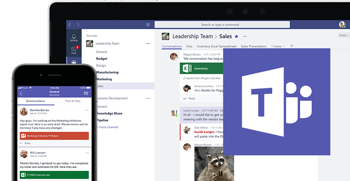Cybersecurity. Cybercrime. Cybercrime prevention. Hackers. Malware and ransomware. These are all terms that are increasingly taking up residence in news headlines around the world. After 2017’s record-setting year of cybercrime, it shouldn’t come as much of a surprise that 2018 seems to be heading down the same path.
The most recent report by the Identity Theft Resource Center (ITRC) shows that there already have been 273 reported data breaches in 2018 through April 1 that have resulted in the exposure of 5,498,547 records.
As such, cybercrime is an area of concern and conversation for TED Talks. These short, powerful talks by experts provide a platform from which to share powerful ideas on a variety of topics in a nonpartisan setting.
But, who has time to go searching for a bunch of videos when you’re busy trying to run a business? Understanding that your time is a premium, I’ve put together the top three TED Talks that I think everyone should watch relating to cybersecurity and cybercrime and why each of these topics matters to your organization.
1. How the U.S. Government Spies on People Who Protest — Including You
In her April 2017 TED Talk, surveillance, and cybersecurity counsel Jennifer Granick talks about the historical use of surveillance by the United States government and the importance of using encryption technology to help protect your sensitive information from prying eyes — including those of government personnel — without a warrant. She also speaks to the importance of addressing surveillance reform.
Granick says:
“We need transparency; and, we need to know, as Americans, what the government is doing in our name so that the surveillance that takes place, and the use of that information, is democratically accounted for.”
In particular, when it comes to the use of encryption, she’s absolutely correct. No matter whether you’re a registered investment advisor (RIA), a distributor, or a certified public accountant (CPA), encryption software can help you protect and secure your invaluable data. At FPA, we always recommend the use of managed encryption services to our clients. But, why is it so useful?
In a nutshell, encryption software can help you:
- Keep your files secure even in the event of an attack;
- Prevent your data from being manipulated; and
- Ensure the safe transmission of your data and files.
With managed encryption services from FPA, our team of experts takes it a step further by managing and monitoring your server and workstation data to ensure your data remains secure.
2. Hackers: The Internet’s Immune System
Cybersecurity expert Keren Elazari speaks to the benefit of good hackers and their practice of “full disclosure” that informs the public of privacy vulnerabilities and security gaps. They are helping to shape the world’s stage and represent a force of change that sets a balance of power between the people and their governments around the world.
Elazari says:
“My years in the hacker world have made me realized both the problem and the beauty about hackers: They just can’t see something broken in the world and leave it be. They’re compelled to either exploit it or try and change it. And so they find the vulnerable aspects in our rapidly-changing world. They force us to fix things or demand something better. And, I think we need them to do just that. After all, it’s not just information that wants to be free. It’s us.”
So while good hackers, or what are referred to as “white hat” hackers, can be an asset to private users by addressing the cybersecurity shortcomings of businesses and governments, bad hackers, or “black hat” hackers, conversely, pose the greatest threat to those same individuals and entities.
Some of the strategies white hat hackers use in penetration testing include:
- Taking a list of known vulnerabilities and data breach techniques and seeing whether evidence of these security gaps exist on your network;
- Investigating to see whether any software installations may have recently been executed to establish backdoors to your network to open up purpose-built vulnerabilities; and/or
- Methods established within the ISACA’s Standards for Information Systems Auditing.
These steps will help this IT security services expert identify any gaps and make recommendations for how your IT staff or managed IT security services can address them before they become major issues.
To help prevent your firm, business, or organization from falling prey to malicious attackers, we provide various levels of security services (depending on your risk tolerance) as part of our managed security services - including security assessments, penetration testing, dual factor authentication, user security awareness training, network security monitoring, as well as software encryption services.
3. Where is Cybercrime Really Coming From?
Security expert and vice president at IBM Security Caleb Barlow addresses the growing threat of cybercrime around the world, which resulted in two billion records being lost or stolen in 2015 and $445 billion in illegal profits. The UN estimates that 80% of these attacks come from highly sophisticated and organized criminal gangs.
Barlow’s answer to this growing threat is for authorities and companies to democratize threat intelligence data and become part of the solution by treating cybercrime like a pandemic healthcare concern. This would require the sharing of timely information between governments, private institutions, and security companies about who is infected and how the “disease” is spreading, as well as telling people who are not infected how to protect and inoculate themselves.
Barlow says:
“The bad guys are moving fast — we’ve got to move faster. And, the best way to do that is to open up and share data on what’s happening... Because, if you share the information, it’s equivalent to inoculation. And, if you’re not sharing, you’re actually part of the problem because you’re increasing the odds that other people could be impacted by the same attack techniques.”
A significant advantage for companies that partner with an experienced managed IT security services company, like FPA, is our ability to learn from security concerns experienced by our other clients. We can share and apply that knowledge to enhance your cybercrime prevention methods and increase your cybersecurity defense through our layered managed security services.
The full portfolio of these services include:
- Managed Intrusion Detection Systems (IDS) and Intrusion Protection Systems (IPS);
- Managed Firewall;
- Managed Encryption;
- Managed Malware Tools;
- Managed Authentication;
- Managed Security Assessment;
- Managed Dark Web ID Monitoring;
- Managed Security Information & Event Management (SIEM); and
- Managed User Security Awareness Training.
Cybercrime is a real and growing threat; it is not something that can be swept under the rug and ignored. I hope these TED Talks have helped to increase your understanding of some of the privacy and cybersecurity concerns that businesses and individuals now face and the importance of implementing strong cybercrime prevention methods to fight them.
What are your thoughts about these experts’ perspectives on cybersecurity concerns and cybercrime prevention? Be sure to share your thoughts in the comments section below or send me an email to chat about this topic more in-depth.
/fpa-logo-tagline.gif)






